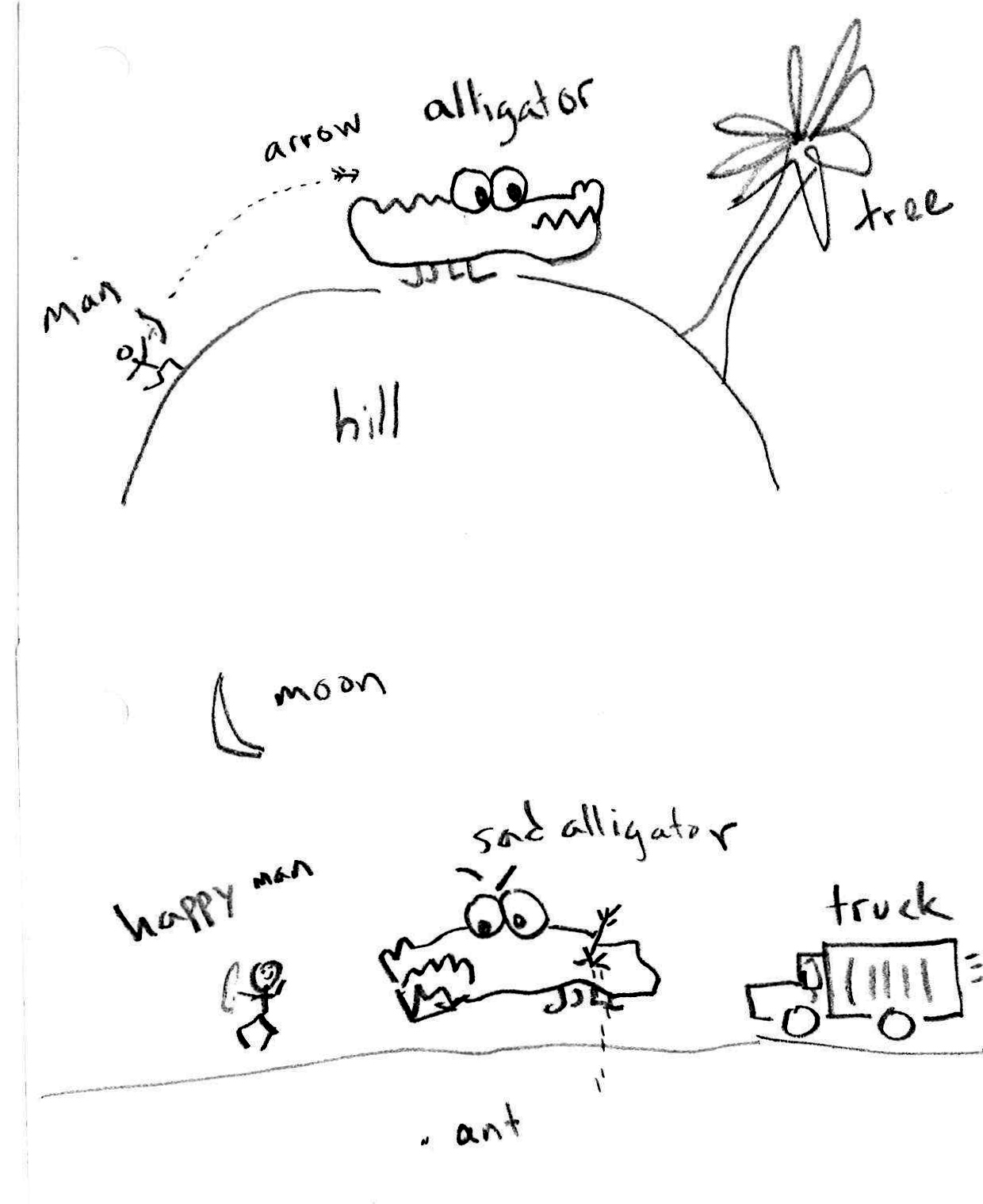(Poem #225 on new numbering scheme)
In time, some questions coalesce, with answers no one knows. The pallid moon is marching high. The night's cold darkness glows.
– a quatrain in ballad meter.
(Poem #225 on new numbering scheme)
In time, some questions coalesce, with answers no one knows. The pallid moon is marching high. The night's cold darkness glows.
– a quatrain in ballad meter.
(Poem #224 on new numbering scheme)
The thing about most Sundays is that nothing gets begun. I barely ever finish things, cause 'nothing' can be fun.
– a quatrain in ballad meter.
(Poem #223 on new numbering scheme)
The open sky consumed the air, and ancient leaves spun round. The ghosts attempted passing through, their feet became the ground.
– a quatrain in ballad meter.

(Poem #222 on new numbering scheme)
The tears they flowed across her cheeks; her friends could not be reached; the judges ruled and set her fate: the president, impeached.
– a quatrain in ballad meter.
(Poem #221 on new numbering scheme)
The alligator on the hill was shot by arrows cruel. The man was happy then to see that hungry, bleeding fool. The moon it glowed up in the sky the ant he crawled below the man's friends came to take the beast: they took it to a show.
– two quatrains in ballad meter. The picture came first – a doodle drawn during a slow moment at work, to entertain a child sitting next to me. Then I made the poem to go with the picture.

(Poem #220 on new numbering scheme)
I found out that my students lied. They said I didn't give a homework task to them last week. In fact, I really did.
– a quatrain in ballad meter, but the rhyme is defective – it’s just assonance.
(Poem #219 on new numbering scheme)
The cat was lurking in the path. A blueness dreamed the sky. Some leaves arranged the wind and sun. The moon can't tell me why.
– a quatrain in ballad meter.
(Poem #218 on new numbering scheme)
Her voice was just like silence, then - You couldn't hear a thing. Her shyness conquered all her thoughts, But inside, she could sing.
– a quatrain in ballad meter, about a student, Eunjae.
(Poem #217 on new numbering scheme)
"If you don't want to know the truth," he said, his grin unkind, "You must imagine everything is only in your mind."
– a quatrain in ballad meter.
(Poem #216 on new numbering scheme)
A place where you can see the sea among the grassy dunes: the wind is strong and claws the sand, the waves just hum their tunes.
– a quatrain in ballad meter.
(Poem #215 on new numbering scheme)
One foggy night I walked and met The Land Surveyor, K. He shared with me his boring hopes, his bureaucratic day.
– a quatrain in ballad meter. A nod to Kafka, presumably, although the Ardisphere had a land surveyor, K, too.
(Poem #214 on new numbering scheme)
I walk the streets to work each day and there's a restaurant. It uses wood to cook its food: the smell - it tends to haunt. Aromas paint the air with thoughts and memories of youth; the burning wood recalls to me those camping trips: Duluth. October in the northern woods along Superior; We drove and sang Bob Dylan songs Or stopped there on the shore. Eventually we'd find a camp, where we could raise a tent. We'd light a fire, or take a hike, I guess it's time well spent. So nowadays I miss my friends, our lives each have their track, but when I pass that eating place the smells, they draw me back.
– five quatrains in ballad meter.
(Poem #213 on new numbering scheme)
I had this dream about a bridge it's unforgettable. The bridge was shaped like dancing harps it seemed impossible.
– a quatrain in ballad meter.
(Poem #212 on new numbering scheme)
We know that tigers have their stripes, which gives them perfect souls, and that their fur is beautiful, a glow like burning coals.
– a quatrain in ballad meter.
(Poem #211 on new numbering scheme)
Pues iba caminando yo, de paso raudo fui. Me devoró la oscuridad. Así permanecí.
This is a poem written in English ballad meter. It’s not so easy to write a poem in Spanish using this English metrical pattern. In particular, although Spanish possesses clear stressed and unstressed syllables, natural Spanish rhythms are strongly trochaic, so forcing it into an iambic line is quite awkward.
(Poem #210 on new numbering scheme)
My friend, he said, "It's no big deal," to me, with wise élan. I went into my surgery. "Well, life is nothing, man."
– a quatrain in ballad meter, about another time.
(Poem #209 on new numbering scheme)
"Its time now, look, that starship waits," the alligator said. "Okay, let's travel to the stars." The monkey bent his head. The friends began their arduous trip; the parsecs zoomed right by. Their boredom grew unbearable, and one began to cry. "Oh, how can we survive so long? I wish this trip would end." The two of them, disconsolate... The reptile ate his friend.
– An absurdist space opera in three quatrains using ballad meter.
[daily log: walking, 7km]
(Poem #208 on new numbering scheme)
The ice, it dwells with arrogance in shadows, never more unknowable than when it melts, to form a tiny shore.
– a quatrain in ballad meter.
(Poem #207 on new numbering scheme)
The other day they forecast snow, but then instead it rained. I don't dislike a rainy day, but snowless, I was drained.
– a quatrain in ballad meter.
I have decided to continue to challenge myself, and therefore the next poetic form I will undertake is a more native (i.e. traditional) English poetic style, called the “Ballad meter.” These are alternations of 4 and 3 (mostly) iambic feet grouped in quatrains, with a rhyming scheme a b c b. Much famous poetry in English follows this pattern, such as Coleridge’s “Rime of the Ancient Mariner.” Many well known songs and hymns also follow this meter (or, also, the very similar so-called “common meter” which differs only in having a “tighter” rhyming scheme a b a b), such as the songs “Amazing Grace” and “America the Beautiful,” as well as the theme song to “Gilligan’s Island.” I guess there is no specific name for a single quatrain of ballad meter verse, so I’ll just call them daily quatrains – or maybe sometimes I’ll try to make more.
I have never successfully done much poemifying in traditional English stress-timed meters – despite being a native speaker, the stress-timed patterns have always felt unintuitive to me, while I have been making more rewarding efforts at syllable-count-based poetry since middle school. I am much more comfortable with syllable-timed patterns such as predominate in e.g. Italian, Spanish, Japanese or Welsh. Hence my previous efforts at this “poem-a-day” blog have been on such forms as the nonnet (originally Italian) and englyn (originally Welsh), with occasional haiku back there, too.
![]()
(Poem #206 on new numbering scheme)
One hundred and one poems drawn from the sea's foamy rims thrust into imagined homes lost among time's felled columns.
– an englyn proest dalgron
My intention is that this is my last englyn. I’ll try to start something different for my daily short poems, soon.
(Poem #205 on new numbering scheme)
I got to heaven at last. Prices were high. The cars, fast. I looked around, aghast. Should I cry? Then I knelt down, downcast.
– an englyn unodl crwca
(Poem #204 on new numbering scheme)
"Why do you write in your mind, like some old bard?" asked my friend. "I'm preparing for the end of time, when the spaceships land."
– an englyn proest dalgron
(Poem #203 on new numbering scheme)
Mostly I'm just drawing lines across a landscape of bones which rest beneath the dry rains of ash, covering my sins.
– an englyn proest dalgron
[daily log: walking, 1.5km]
(Poem #202 on new numbering scheme)
A series of explosions on philosophical moons changes orbits and begins to undo people's notions.
– an englyn proest dalgron
(Poem #201 on new numbering scheme)
My friend, who is my reader, celebrates his birth date. He's older. Some old snow lurks like litter, here and there, on the corner.
– an englyn unodl union.
(Poem #200 on new numbering scheme)
The octopus was alive. But then it began to have problems in the soup. It strove to remember... what is love?
– an englyn proest dalgron, referencing the Korean custom of eating raw octopus that’s still wiggling.
(Poem #199 on new numbering scheme)
I'm plummeting through life: down... Voices on all sides: a din... Days end; days begin: each dawn... Without purpose - but not done.
– an englyn proest dalgron
(Poem #198 on new numbering scheme)
On that first day, just one step starts the world's making. Top- down it goes, never to stop, quantum nodes placed on a map.
– an englyn proest dalgron
(Poem #197 on new numbering scheme)
Weirdos are chanting by threes, and dancing, Yelling at the pine trees. From the north there wails a breeze, So their madness starts to freeze.
– an englyn unodl union. This strikes me a more than a little bit Dylanesque – not that that’s an assertion of quality – it just has that feel to it.
(Poem #196 on new numbering scheme)
On the shelf I found a book. I pulled it down, took a look. But sadly, the words shook: no meaning; foaming gobbledygook.
– an englyn unodl crwca
[daily log: walking, 1km]
(Poem #195 on new numbering scheme)
She'd heard the teacher's call, so she tried. Her pride before her fall - Orange letters - not so small - she wrote her word on the wall.
– an englyn unodl union. This is about my student who said “no.”
![]()
(Poem #194 on new numbering scheme)
Laser-focused, I stumble through my apathy, tremble, wishing I were more nimble, each step a kind of gamble.
– an englyn proest dalgron
(Poem #193 on new numbering scheme)
The green gorillas will gasp and dance below clouds. A wisp of mist gropes the trees that grasp the hills. The cool air is crisp.
– an englyn proest dalgron. It may be surprising to hear that this is based on a fragment of a vivid dream I had 36 years ago, in 1981, while still in high school. I recorded it then in a journal I had. But this poem was written without consulting that journal – it’s just an image/story/vision that sticks with me. The full dream ended with nuclear holocaust – recall that I was in high school during the age of Reagan.